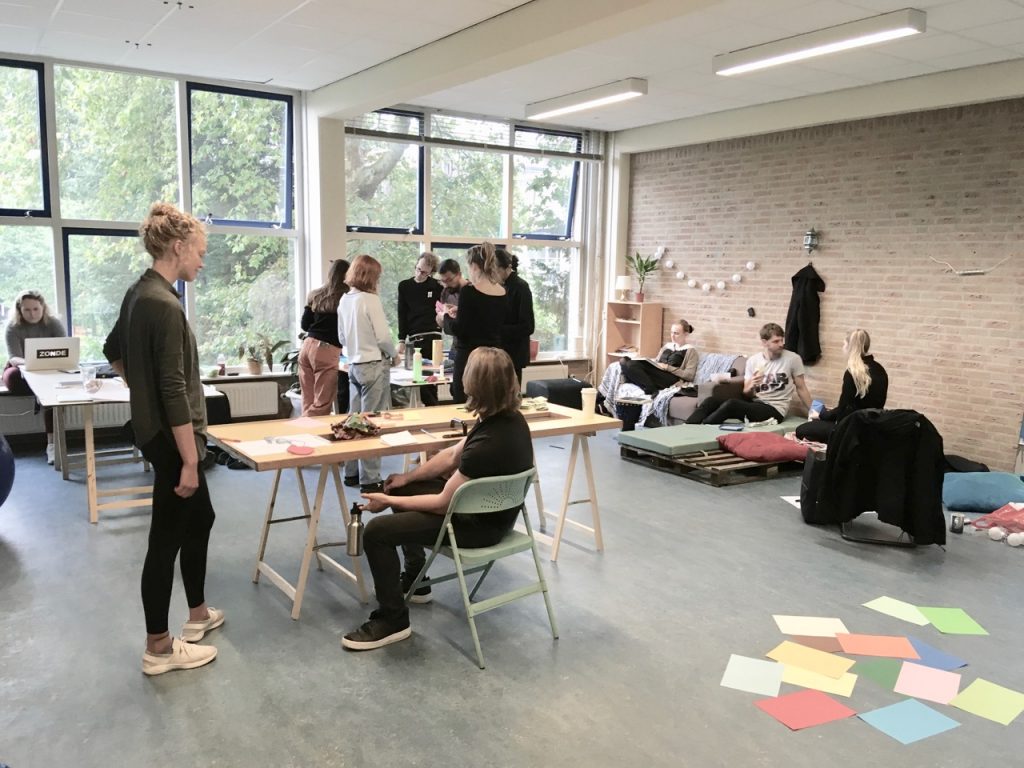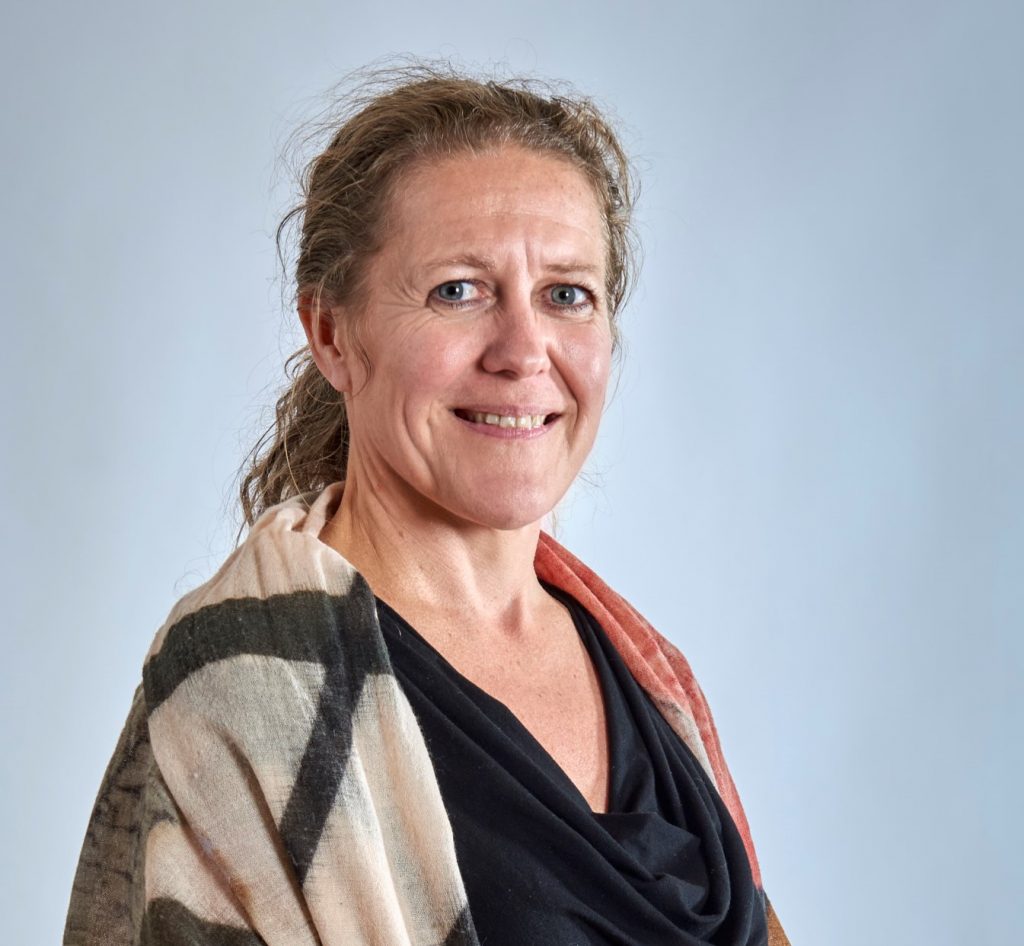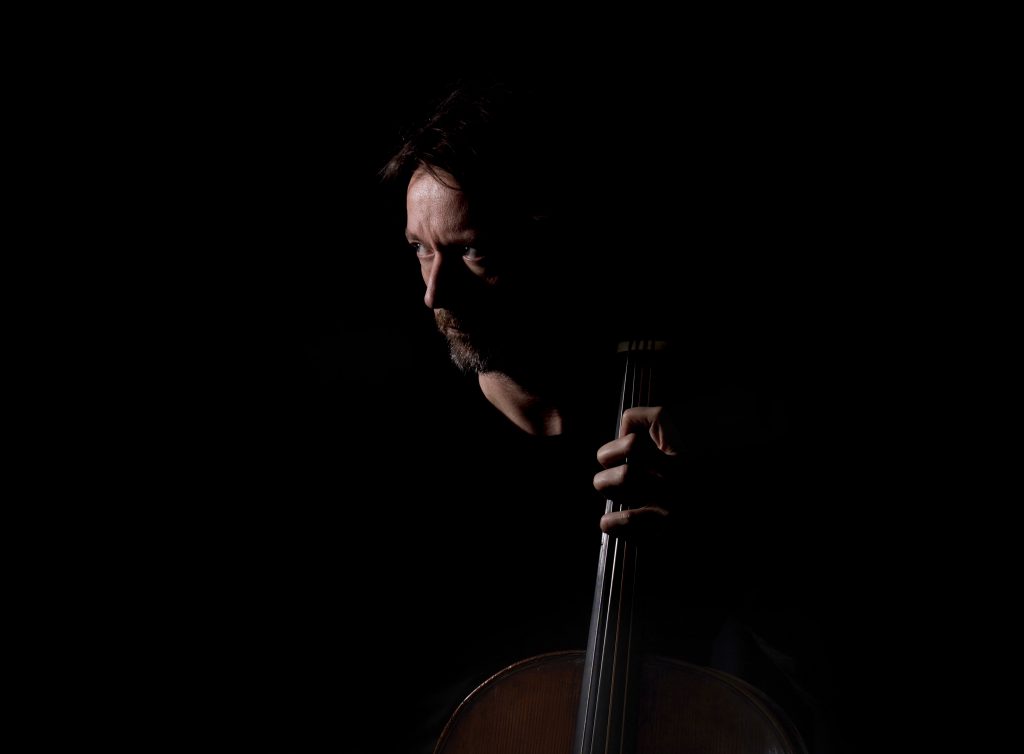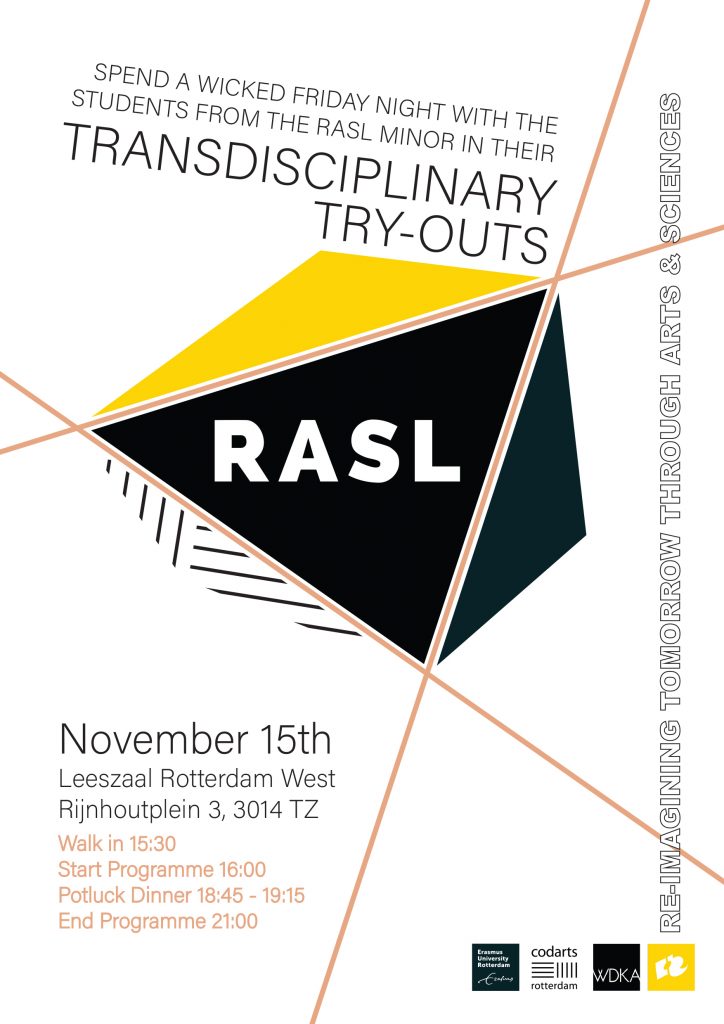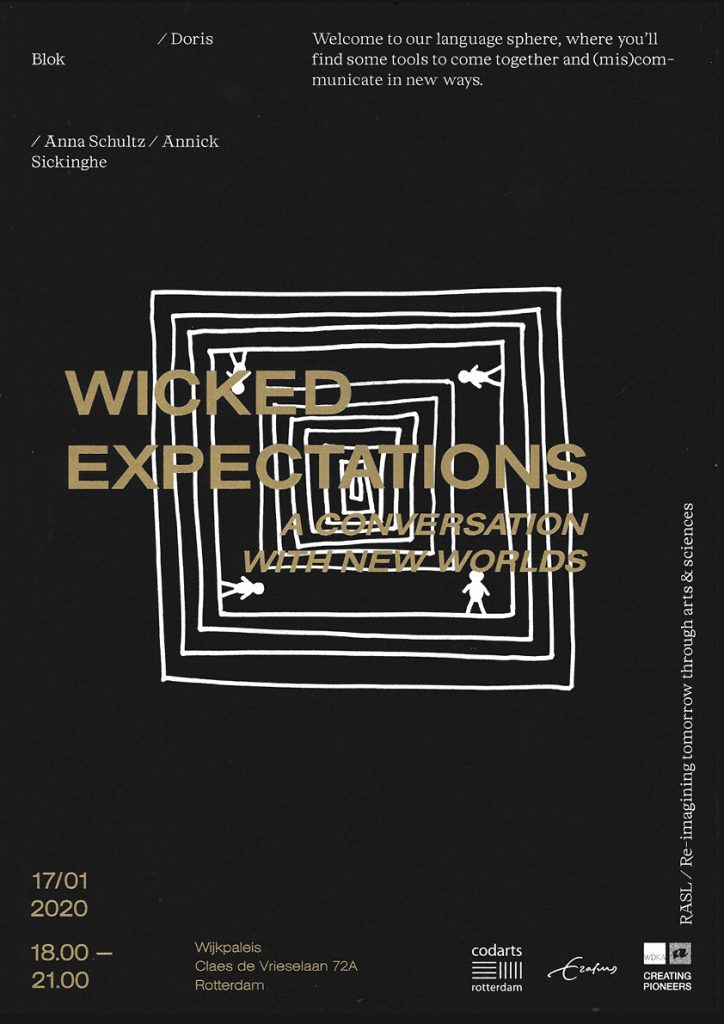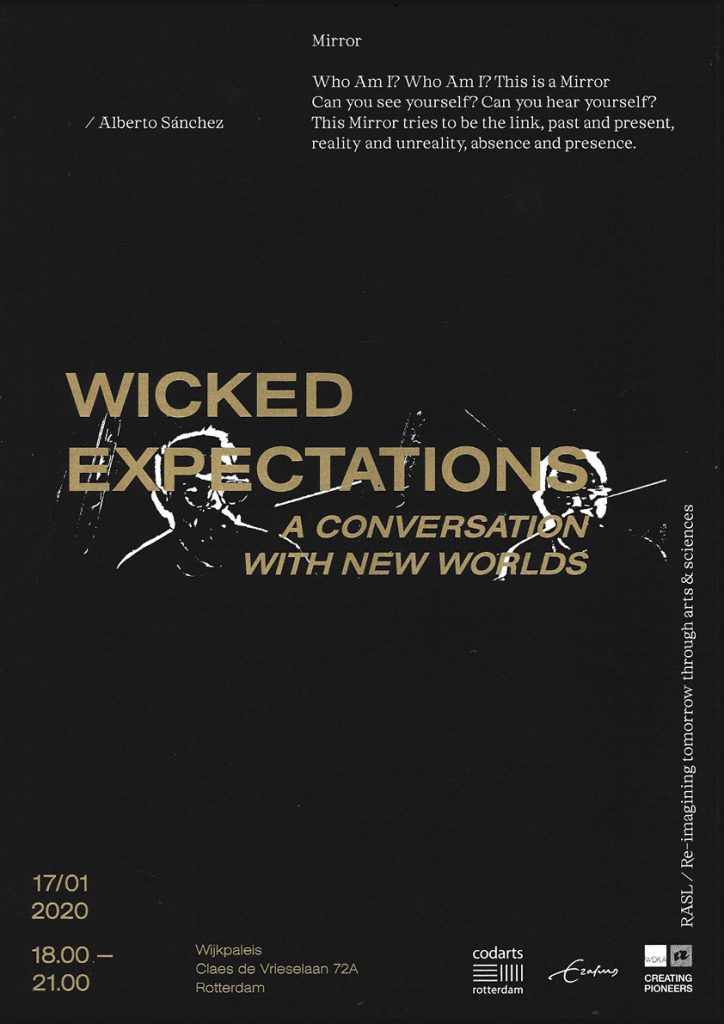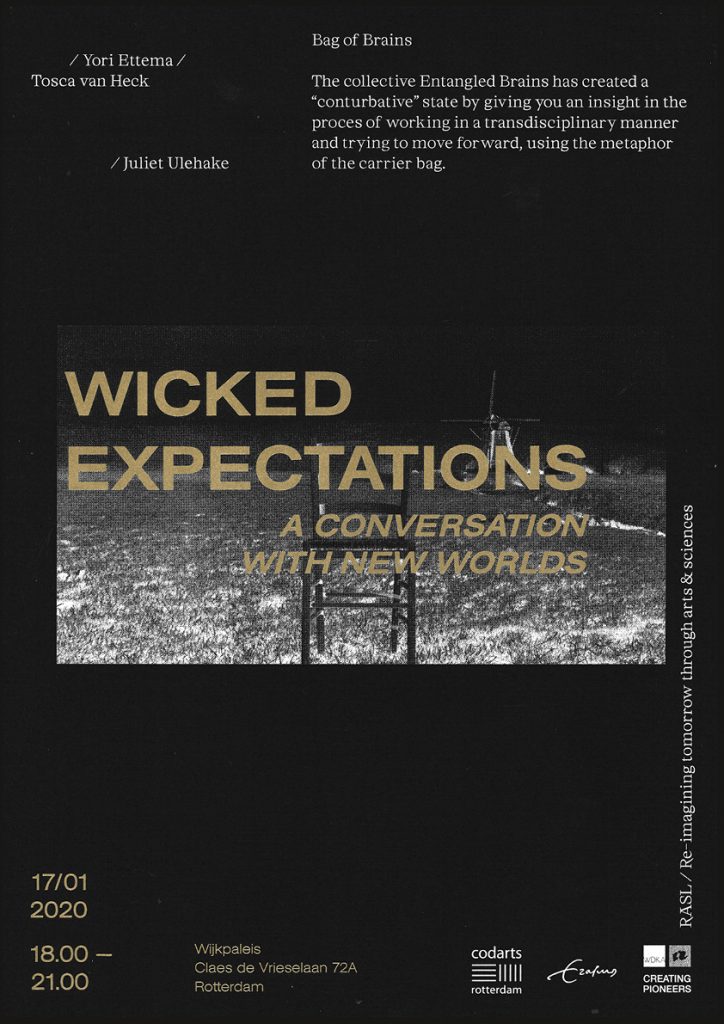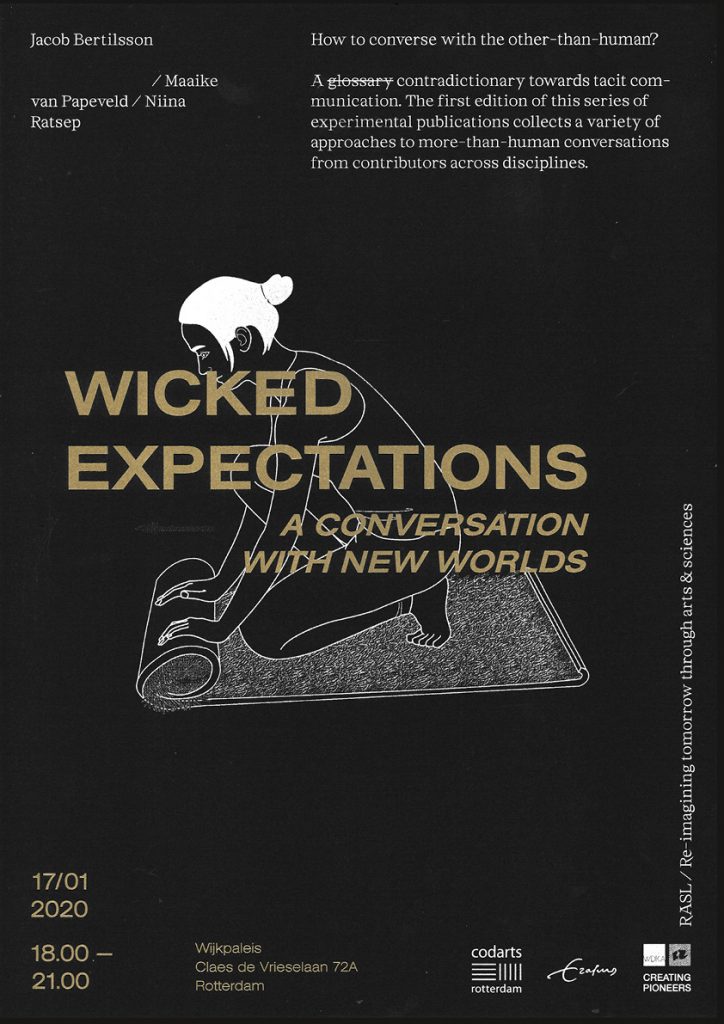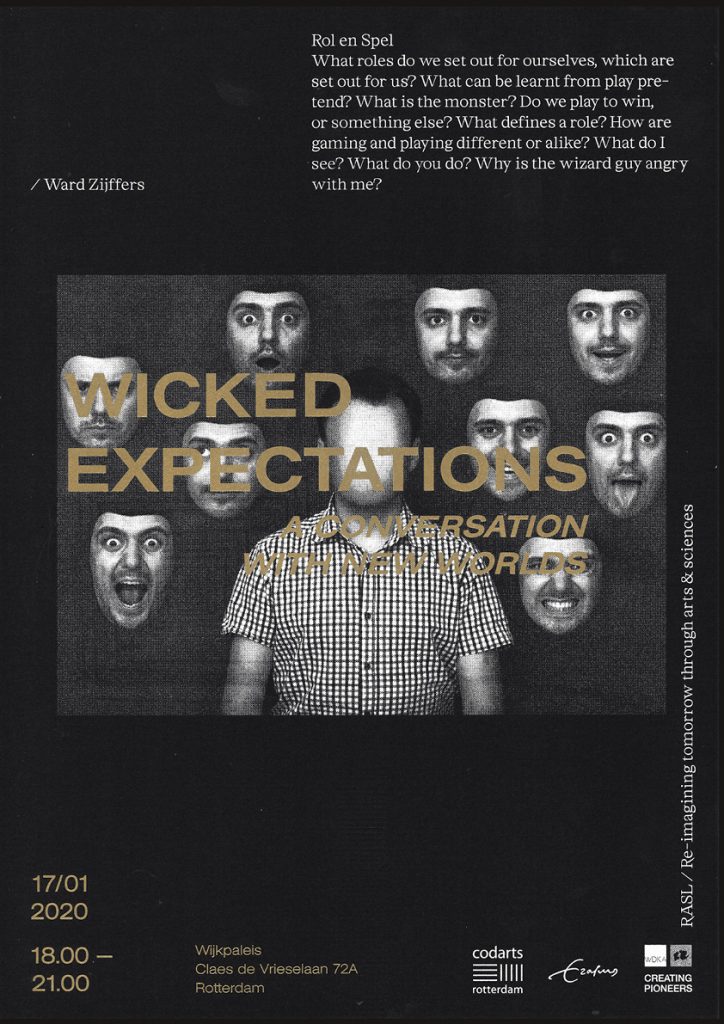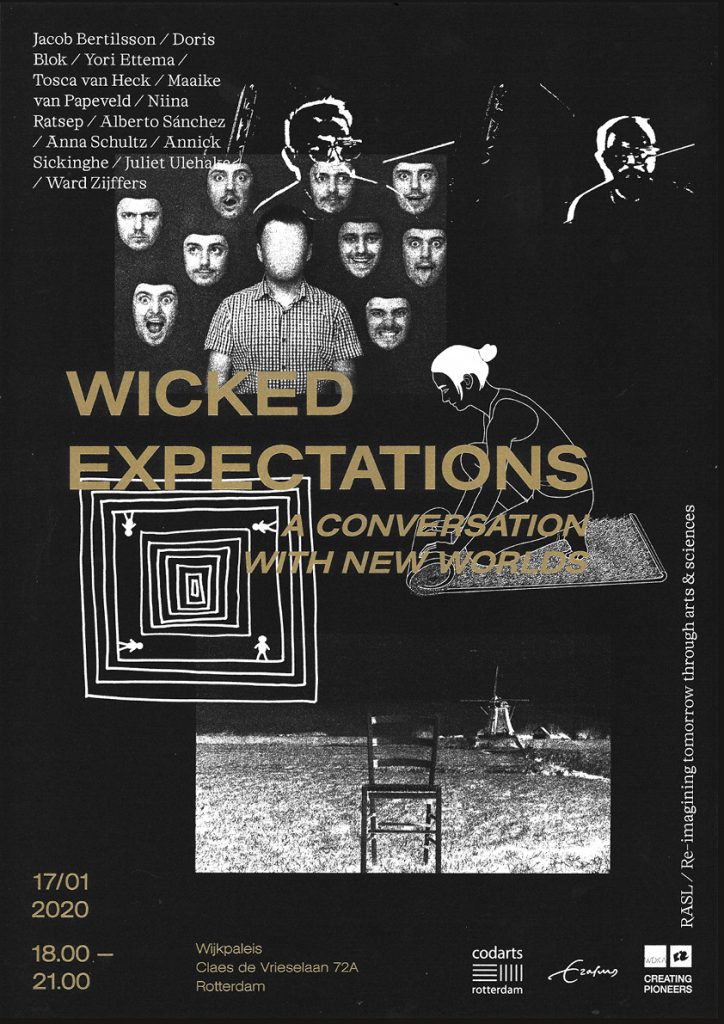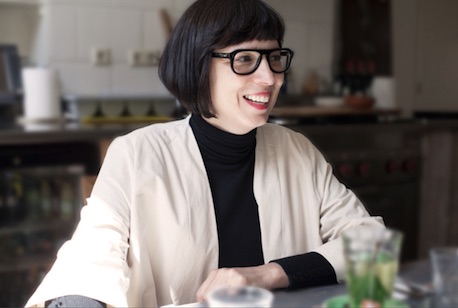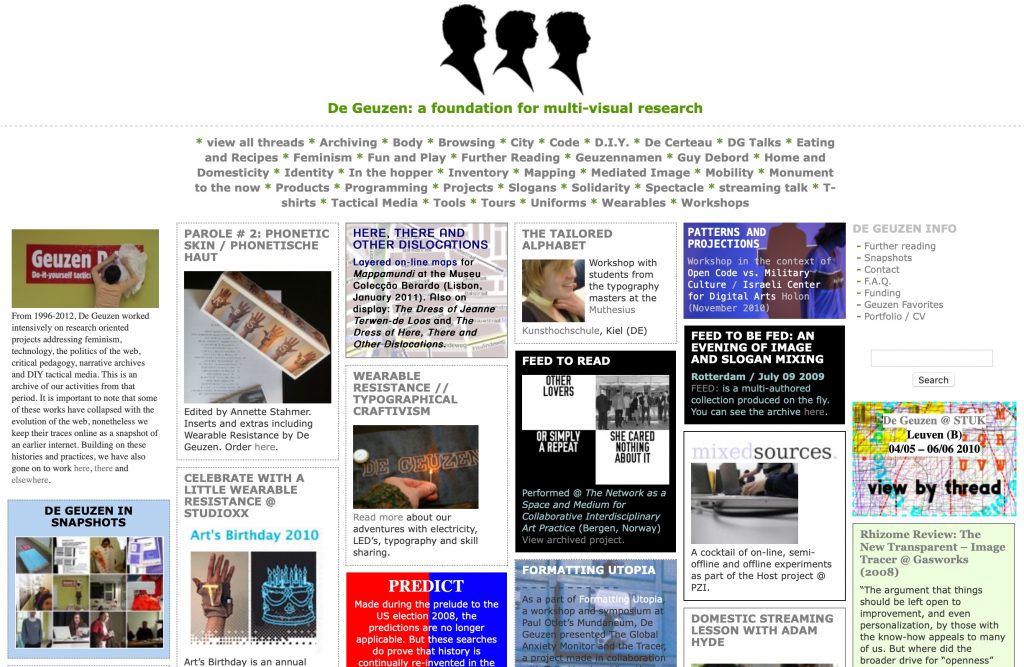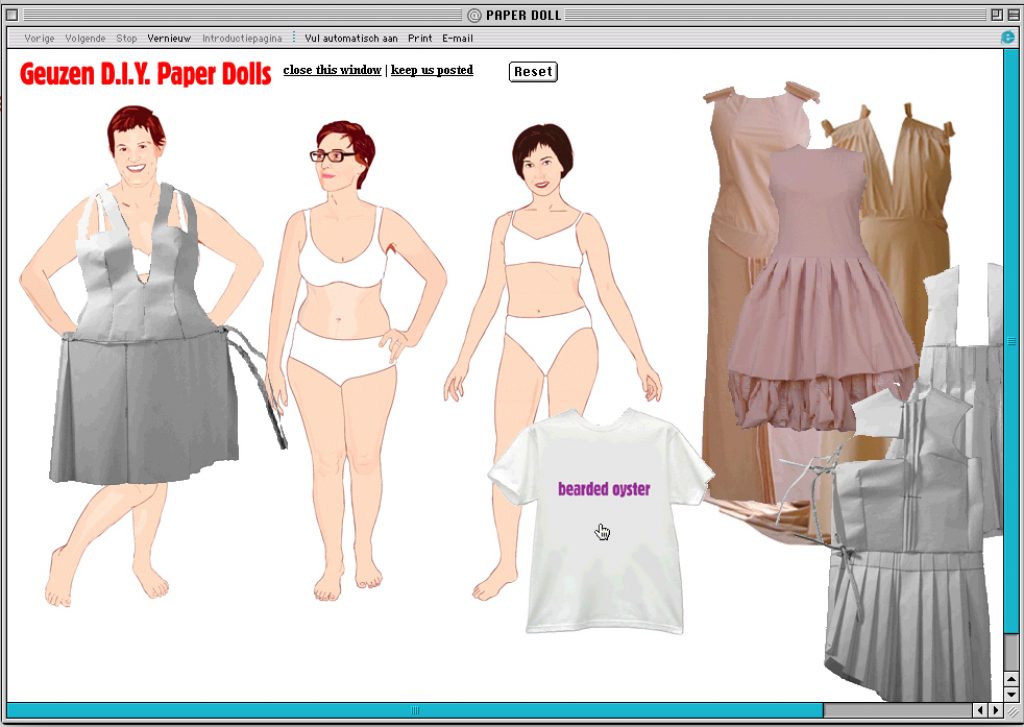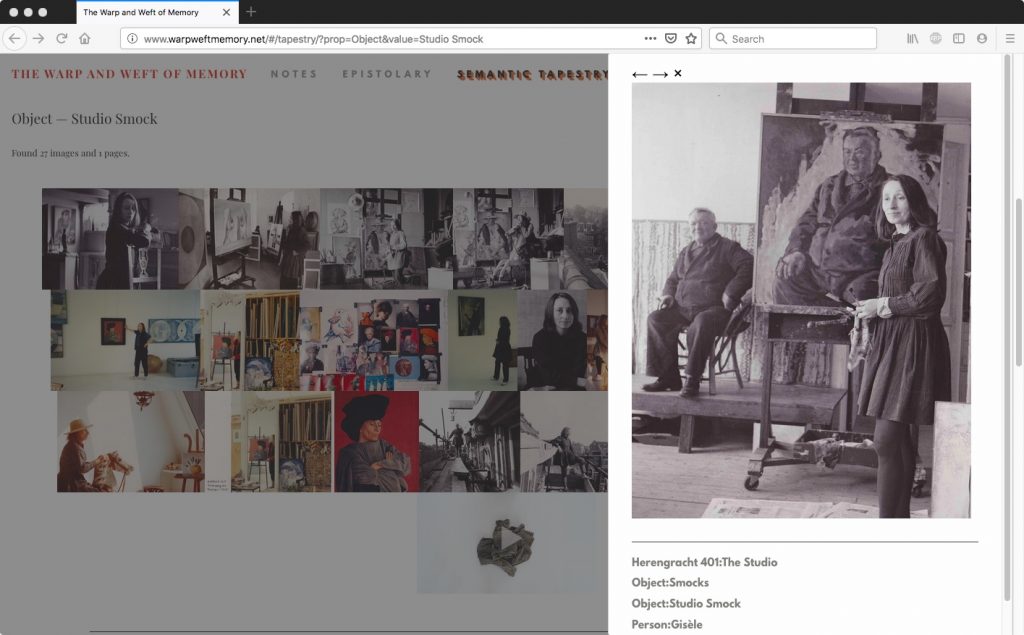The Rotterdam Arts and Sciences Lab has initiated the minor Re-Imagining Tomorrow through Arts & Sciences for students of music (Codarts University of the Arts), fine arts (Willem de Kooning Academy) and sciences (Erasmus University). During the minor, students work with and in zones of tension that arise when engaging in transdisciplinary collaboration across and beyond the arts and sciences. In our pedagogical vision, we put forward our conception of transdisciplinarity and the pedagogical principles underlying the programme.
Transdisciplinarity is a contested, fuzzy concept. While its boundaries are imprecise, we can nevertheless distill two dominant conceptions of what it means to be or become transdisciplinary. The first conception of transdisciplinarity emphasizes the improvement of scientific practices by bringing together scientists and external stakeholders (from government, industry, society) to articulate and solve complex research problems. This particular conception emphasizes mode-2 knowledge production (Gibbons et al., 1994), and is particularly prominent in environmental and sustainability studies. The second conception of transdisciplinarity is more explicitly focused on creating new ways of thinking and doing through paradigmatic shifts, which challenge and change existing structures lying at the root of complex societal issues. This second meaning emphasizes the suitability of transdisciplinary collaborations across different knowledge domains to enable these paradigmatic shifts.
The difference between the two approaches
is crucial: while the first treats transdisciplinary in an additive mode,
emphasizing the problem-solving potential of transdisciplinary practices, the
second approaches transdisciplinarity as a mode to rearticulate complex societal problems. In this capacity, the
second conception of transdisciplinary research is akin to pragmatist social
philosophies that take seriously the (artistic, disciplinary, technological)
means by which ‘societal problems’ come to be articulated, and the various
publics involved in their articulation or formation (see e.g. Marres, 2012). Manfred
Max-Neef (2005), then, categorises these two types of transdisciplinarity as
weak and strong, with weak transdisciplinarity referring to the practical,
systematic approach of tackling problems, and strong transdisciplinarity as a
way to see the world in its complexity and interrelatedness. While weak
transdisciplinarity can be part of a strong transdisciplinary approach, in and
of itself it does not achieve paradigmatic shifts, as it requires a highly
reflexive attitude to do so.
It is only through extensive
critical reflection on existing power relations that learning can take place
that enables ‘an onto-epistemological shift among a group of collaborative
researchers’ (Ross & Mitchell, 2018). This means addressing not only
dynamics of inequality between disciplines and epistemologies, but also the
Humanist, Eurocentric and anthropocentric foundations on which western
education is built, in order to arrive at ‘non-dominant relations across
difference’ (De Lissovoy, 2010). In their proposal for Transforming Transdisciplinarity, Mitchell and Ross (2018) emphasize
this way of learning as a way to allow for a deeper level of collaboration that
encourages strong transdisciplinarity.
In the minor Re-Imagining Tomorrow through Arts &
Sciences, we create a setting in which students can approach this higher
order of collaborative practice and facilitate this through extensive critical
reflection on the ways we think, make and learn, in order to encourage strong
transdisciplinarity and stretch ways of knowing and being in the world. In
close collaboration with the tutor team, students explore what it means to work
and learn together with teachers, their fellow students and guest experts. They
find themselves in the complicated space in-between several institutions, and
engage in self-directed research in which they can question the very structures
that shape their education and worlds.
Provisional pedagogies in zones of
tension
To enable this, we make
explicit and work with the frictions, conflicts and paradoxes inherent to
transdisciplinary practice across and beyond the arts and sciences. These
tensions emerge as a result from the coming together of people with different
disciplinary backgrounds, world views, ways of knowing, dispositions and
practices. In so doing we aim not to gloss over such differences and tensions,
but to make them productive. While there are differences between participating
members in any collaborative setting, in transdisciplinary collaborations the
acknowledgement of, and working with difference is essential because it makes
visible disciplinary logics and paradigms. Difference in transdisciplinary
collaboration manifests itself in zones of tension, where discipline-informed
ways of doing clash with each other and with certain core aspects of
transdisciplinary practice.
From previous
experiences with transdisciplinary education across and beyond arts and
sciences, as well as from literature on the topic, four zones of tension have
been identified that lie at the core of this type of transdisciplinary
education:
- Collaboration
across and beyond disciplines:
collaboration between and beyond disciplines has a tendency to take shape in an
additive form, in which different approaches or practices are simply ‘added’ to
each other to produce a putative ‘view from nowhere’ (Haraway, 1988). Such an
additive approach, however, has significant drawbacks, in that it does not
necessarily require reflexivity and third-order reflection on the character of
disciplinary knowledges and practices themselves. Throughout this program,
then, teachers and students will be challenged to not only ‘bring in’
knowledges and practices, but to critically reflect on the knowledges and
practices they are already working in (and which they might not be very aware
of). This dimension also has a social component. While social dynamics in
transdisciplinary teams may come to rely on an idea of individual participants
as representatives of ‘their’ practice, the task of this programme is also to
allow people to reconsider their own practice in a critical fashion.
- Equality of knowledge: collaboration must take place on the
basis of an assumption of equality of knowledge. At the same time, this
emphasis on non-hierarchical relations between disciplines and practices runs
the risk of sliding once again into the additive model of transdisciplinarity,
in which knowledges can simply be stacked up without necessarily producing a
transformation in the way concerns are apprehended or articulated. Equality of
knowledge, then, also requires of students an attitude of attention and
curiosity with regards to other ways of knowing and acting.
- Engagement: there is a productive tension, in
transdisciplinary research and practice, between ‘engagement’ as a matter of
political choice and volition – one chooses to be or become engaged with
political issue X or Y – and engagement as a condition of social life, in which
we are always already ‘engaged’ with each other and with the world through
networks of various sorts (technological, aesthetic, economic, etc.).
Transdisciplinary practice has to be aware of these modes of engagement and
bring them into productive relation with each other.
- Making
public(s): Making
public the outcomes of research or artistic processes presupposes a receiving
public, or several publics. Publics, however, do not exist prior to being
addressed – they exist in their relation with whatever they are meant to
receive. Transdisciplinary knowledge
and practices, in their creation of new ways of knowing the world, both respond
to and produce new publics. In the minor, students become aware of the
worldmaking capacity of knowledge production, and how (the making public of)
their work and the way in which they present it is not only influenced by their
audience, but also createsnew
publics.
Through
critical reflection on, and a commitment to work fromthese zones of tension, students participating in
the minor not only become aware of the taken-for-granted schematics and habits
of thinking, doing, and making (Cf. Stengers, 2005) underlying structures that
shape how they learn and know the world, but also explore what working in these
zones of tension can do, and how this can lead to new collaborative
practices. In this sense, the
program does not treat transdisciplinarity as a single method or means towards
and end – solving a problem – but rather as itself the object of and for
collaborative, open-ended practice. Precisely what transdisciplinarity would
mean and look like in practice is the very question students will work with and through during their engagement in this minor.
In the minor, teaching staff and students depart on a
journey together to experiment with different ways of collective learning.
Pedagogy becomes not an instrument to impart knowledge or standardized
procedure that predetermine show teaching and learning take place, but rather a
leading question and matter of concern (Latour, 2004). In questioning and
changing how we learn throughout a learning trajectory, pedagogy becomes
multiple, situated, and temporary – pedagogy turns into pedagogies, and these pedagogies are necessarily provisional. Provisional pedagogies
render students capable of staying with
the trouble (Haraway, 2016), that is, they ask and allow them to stay with
and work through the interruptions and perplexities produced in the
aforementioned zones of tension. In this capacity, ‘staying with the trouble’
also requires a focus on process and reflection.
Approaching
zones of tension through an object of shared engagement
When pedagogy becomes the focus of inquiry, the parameters framing the educational
project change with it. Instead of a pedagogical framework determining how
students learn to master a practice or about a specific subject, provisional
pedagogies are animated by an object
of study. The guiding question becomes not: what do we learn about this object?
But rather: how do we learn through engaging with this object?
During the minor, this means that students approach the zones of tension of
collaboration, equality of knowledge, engagement and making public(s) through practices of re-imagining tomorrow. This
‘object of study’ is better understood as an issue of engagement than a
predefined ‘object’; indeed, one of the questions students will need to answer
themselves is what, given this broad concern, precisely ‘their’ object may be.
This object of transdisciplinary
engagement – re-imagining tomorrow – is not chosen arbitrarily. Its emphasis on
imagination and futurity operates in a broader societal context of ecological
devastation, ‘capitalist realism’ (Fischer, 2008), and historically shaped
injustices, in which the possibility of imagining alternative futures has
become a pressing matter of concern. But it is also chosen to bring to the fore
the way in which the more traditional, disciplinary practices of knowing and
doing are always already imaginative,
in that they inculcate students in specific ways of knowing and apprehending
the world. In this context, pedagogies must emphasize and reckon with the mythopoetic character of scientific and
artistic practices (Macdonald 1981), that is, the way these practices allow for
and render possible certain ways of apprehending the world and our
possibilities within it. As such, transdisciplinary practice is uniquely suited
to bring to the surface this disciplinary ‘scaffolding’ of the imagination, as
well as opening up the possibility of transformation. We understand the
imagination not as a disembodied mode of thinking, but rather as something that
emerges in, and is being worked through, in various (partially material)
practices.
Four cycles
Through this transdisciplinary
object, students collaborate in changing teams throughout three or four cycles
(depending on whether they take the 15 EC or 30 EC minor), guided by core
tutors. In the first three cycles, students work collaboratively on cycle
briefs, each framed by a zone of tension, complemented by group sessions and
guest visits. In the fourth cycle (second part of the minor), students follow
an individual research trajectory where they articulate a matter of concern
from a transdisciplinary perspective, with an emphasis on the fourth zone of
tension. The focus is on process and reflection, made tangible in a process
presentation and reflection document at the end of each cycle, and in a
portfolio to be handed in at the end of the minor.
References
De Lissovoy, N. (2010).
Decolonial pedagogy and the ethics of the global. Discourse: Studies in the Cultural Politics of Education, 31(3), 279-293.
Fisher, M. (2008). Capitalist Realism: Is there no Alternative?
Zero Books.
Gibbons, M., Limoges, C.,
Nowotny, H., Schwartzman, S., Scott, P., & Trow, M. (1994). The new production of knowledge: The
dynamics of science and research in contemporary societies. London, UK:
Sage.
Haraway, D. (1988). Situated
Knowledge: The Science Question in Feminism and the Privilege of Partial
Perspective. Feminist Studies 14(3):
575-599.
Haraway, D. (2016). Staying with the Trouble. Durham: Duke
University Press.
Latour, B. (2004). Why has
Critique Run out of Steam? From Matters of Fact to Matters of Concern. Critical Inquiry, 30, 225-248.
Leventon, J., Fleskens, L.,
Claringbould, H. et al. An applied methodology for stakeholder identification
in transdisciplinary research. Sustain Sci 11, 763–775 (2016). https://doi.org/10.1007/s11625-016-0385-1
Macdonald, J. B. (1981).
Theory-Practice and the Hermeneutic Circle. Journal
of Cirriculum Theorizing 3: 130-138.
Marres, N. (2012). Material Participation: Technology, the
Environment and Everyday Publics. Palgrave Macmillan.
Max-Neef, M. (2005). Foundations
of transdisciplinarity. Ecological
Economics, 53(1), 5-16.
Ross K. & Mitchell C. (2018).
Transforming Transdisciplinarity: An Expansion of Strong Transdisciplinarity
and Its Centrality in Enabling Effective Collaboration. In: Fam D., Neuhauser
L., Gibbs P. (eds). Transdisciplinary
Theory, Practice and Education. Springer, Cham.
Stengers, I. (2005). Notes
towards and Ecology of Practices. Cultural
Studies Review, 11(1), 183-196.
